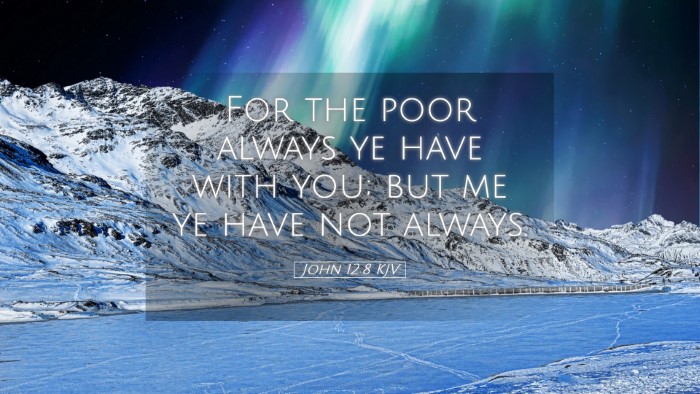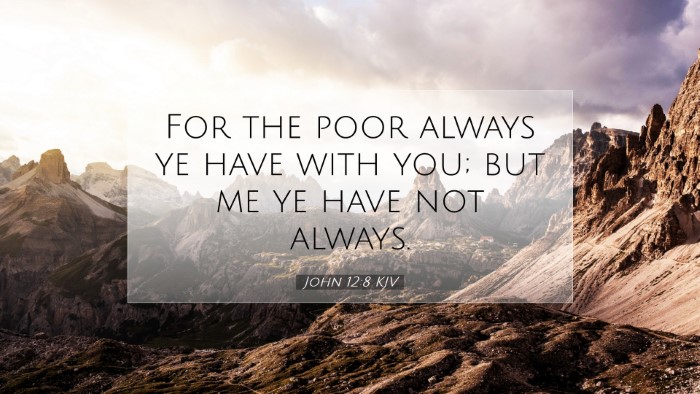John 12:8 Commentary
Verse Reference: John 12:8 - "For the poor always ye have with you; but me ye have not always."
Contextual Overview
This verse appears in the narrative surrounding Mary’s anointing of Jesus with costly ointment. It reveals an important contrast between temporal and eternal values. The statement made by Jesus is both a comment on His impending crucifixion and a profound teaching on the nature of service, priorities, and the presence of Christ.
Interpretative Insights
Matthew Henry's Commentary
Henry emphasizes the significance of Christ's presence among His followers. He suggests that the contrast between the poor and the Christ is a reminder of the transient nature of Jesus' earthly ministry. The statement "the poor always ye have with you" is drawn from Deuteronomy 15:11, portraying the inevitability of poverty in a fallen world. However, the phrase "but me ye have not always" highlights the urgency of the moment as Jesus prepares for His sacrificial death.
Henry observes that this does not advocate for neglecting the poor, rather it encourages believers to appreciate the opportunity of being in the presence of Christ, who brings ultimate fulfillment and hope.
Albert Barnes' Notes
Barnes elaborates on the socio-economic implications of Jesus' words. He points out that this verse does not give permission to ignore the needs of the poor but suggests that the occasions for serving Christ are unique and limited. The implication is that earthly concerns, while significant, should never overshadow the importance of recognizing and honoring Christ's presence.
Furthermore, Barnes explains that the phrase implies a time for everything, reinforcing the notion that there are moments in which we must prioritize spiritual engagements over material obligations.
Adam Clarke's Commentary
Clarke interprets this passage as a profound statement regarding the nature of Christ’s mission and the limitations of His time on earth. He posits that Jesus was preparing His disciples for the reality of His absence after the crucifixion. Therefore, He emphasizes the importance of making the most of their time with Him for spiritual growth and development.
Clarke also stresses that while temporal needs are important, there is a greater need for spiritual communion. He notes that the presence of Jesus fulfills a longing that material assistance cannot satisfy.
Theological Implications
From these insights, several theological themes emerge:
- Priority of Christ's Presence: The essence of Jesus' statement is to prioritize one's relationship with Him over material concerns. This reality calls for believers to cherish and capitalize on every opportunity for spiritual intimacy.
- The Perpetuity of Poverty: Jesus’ acknowledgment of the poor reflects the ongoing societal issue of economic disparity. It serves as a reminder of the Church's mission to care for the needy.
- Urgency of Service: Recognizing that Christ’s physical presence is finite creates an urgency to engage in worship and service while the opportunity exists. The immediacy of action is an important theme in Christian living.
- Spiritual Fulfillment vs. Material Needs: This passage invites believers to reflect on what truly satisfies. While honoring the needs around us, it simultaneously calls for a deeper recognition of our spiritual needs and the fulfillment found in Christ.
Conclusion
John 12:8 serves as a profound reminder for Christians to focus on what is eternal amidst life’s transient nature. By integrating the insights from these commentaries, we understand the importance of temporal service towards the poor while valuing the eternal presence of Christ. As we navigate our lives, may we find a balance that honors both spiritual and material needs in a manner that glorifies God.


